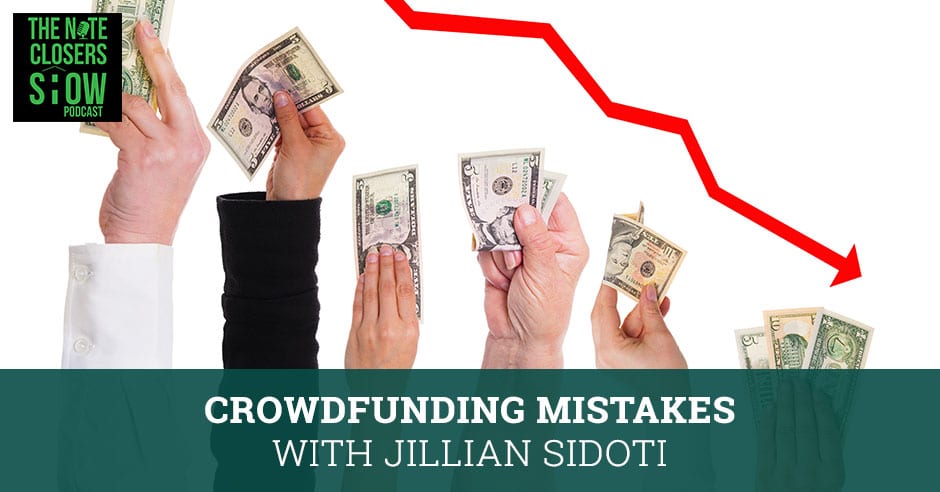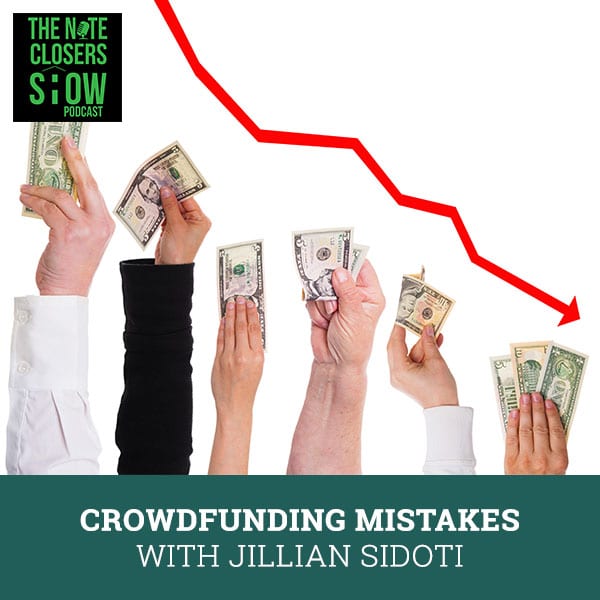
—
Listen to the podcast here
Crowdfunding Mistakes with Jillian Sidoti
We have a very special guest. We have somebody who has exquisite taste and who is absolutely awesome, just kicking butt and taking names, helping a lot of real estate investors out there. She has exquisite taste in wine and shoes. You can always trust somebody who’s got some good taste, would sit down and have a glass of wine or beer while you’re talking about the business. Who am I talking about? Let’s give a big warm We Close Notes and Note Closers Show welcome to our very special guest, Jillian Sidoti. How are you doing?
I’m doing great. Thank you and thanks for having me.
For those who don’t know who you are, why don’t you give us your bio? The reason why Jillian is here is we get so many questions about raising capital properly. Jillian, take it away. Tell us a little about yourself.
I’m a Securities Attorney and I’m in Southern California. What a Securities Attorney does is help entrepreneurs figure out how they’re going to raise money for their deals. We help them do it legally and have all the proper paperwork.
You’ve been practicing for how long?
Twelve years.
Let’s talk about a couple of things when it comes to raising capital, especially with all the crowdfunding things going out there in the industry. Let’s talk a little bit about some of the changes that had taken place in the last few years.
Back in 2012, they had the Jobs Act passed. What we have seen happen is that more people are now advertising for investors because there are a couple of different rules that allow you to advertise for investors. One of those rules is 506(c), which allows you to raise money from accredited investors only. You can do general solicitation, but you have to verify that those investors that are coming in your deals are indeed accredited. For those of you that don’t know, an accredited investor is somebody who makes $200,000 a year as an individual, $300,000 a year as a married couple or has a net worth of $1 million exclusive of primary residence. That amount of money is only about 3% to 10% of the population depending on what statistics you look at.
Although there are a lot of credit investors out there, if you think about it, we have a country of about 350 million. You’re looking at about eleven million, 10.5 million people are accredited investors. They are out there but it is a very small part of the population. That’s definitely something to think about when going out and raising private capital. The other thing too to think about when you’re dealing with investors and 506(c) and advertising, people don’t respond well to brash ads of, “I need investors.” It seems desperate and it doesn’t work. Think about that before you get all hot and bothered about using 506(c) offering and raising money that way.
Would you agree that investors want to see something tangible in deals before pledging funds in theory?
You should have your stuff together. Ads like, “I’m offering a 15% return secured by real estate” means nothing to anyone. That advertising has never worked and it’s not going to work now, whether you are able to do it legally or not. You have to think about educating the investor before even asking them for anything. The investors are going to come to their own conclusion. If you educate them enough, they’ll come to their own conclusion on what they should do and how they should invest. If you go out and talk about your note business, how your note businesses going, what you are planning on doing with your note business and why you’re seeing good deals here or there, people are naturally going to ask, “How can I get in on this?” If you’re educating them enough and you’re showing them that you’re an expert. That is education-based marketing and the best type of marketing and the marketing you should stick with.
Also if we look at the statistics, the old rule where you couldn’t do any advertising was called 506. That changed into 506(b) and then 506(c) came along where you can do advertising. I pulled the statistics last June and 93% of the offerings that have been done since 506(c) was enacted are 506(b) offerings. That means that only 7% of the people who are doing private offerings of that type are going out and advertising and using 506(c) and only accredited investors. There’s something to be said that there’s value still in doing a marketing approach where you’re marketing your company and not your opportunity.
I love what you’re talking about how to educate potential investors because that gives them the real knowledge because a confused brain is a no-brain. I’ve always been a big believer that investors want to first know that they can trust you. You know what you’re doing. They can get their money back and the return on investments is the third or the fourth thing they think about.
It doesn’t matter how much the return on investment is if they can’t trust you.
You have done some pretty cool things out there. Jillian is a partner in Trowbridge Sidoti LLP. Their website is CrowdfundingLawyers.net. You’ve done some Reg A as well for some people. Why don’t we talk a little bit about the difference between a 506(c) and a Reg A as well?

Crowdfunding Mistakes: There’s value still in doing a marketing approach where you’re marketing your company and not your opportunity.
The new Reg A+ is also from the Jobs Act of 2012 and it allows you to raise up to $50 million. You have to get SEC approval to go out and raise any capital. Once you go out and get the approval from the SEC, you can advertise for any investor. You can advertise for accredited or unaccredited investors. It doesn’t matter. There are some rules on how much each investor can invest, but it does give you some freedom to go out and raise capital. One of the deals I did, it hasn’t been approved yet. You can’t invest in it yet, but one of the deals I did was Grant Cardone. I did his Regulation A+. I also did one that’s out there called Tulsa Real Estate Fund, which raised a lot of money in a very short period of time, all through social media so you can check them out as well. Also a couple of other real estate funds out there. I do have a mortgage fund down in Florida, you can do a note fund. That is possible. There are lots of different opportunities out there.
When somebody is thinking about putting the fund together like that, what are some of the things that they should consider?
If you’re going to do a Reg A+, you should go out and try to raise money under 506. Do not have your first time of going out and raising money be under Reg A. If you have great marketing and if you’ve done stuff before or you have a cadre of unaccredited investors who are good people, who will invest well and are at least somewhat educated investors, then a Reg A might make sense. The reality is you need at least $75,000 to get a Reg A up and going. If you don’t already have the market for the Reg A, the Reg A itself is not going to do anything for you. It’s not going to be like a magic bullet. I probably turn away more clients than I take on for Regulation A.
I probably talked more people out of it than I talk into it. I don’t want to take anybody’s money who’s not ready to do one, who’s going to fall flat on their face and not be successful in raising capital. That is a big thing that I insist that people have it together and a network big enough to support doing a Regulation A+. There’s a lot of stuff you have to do. You have to get an attorney that’s going to get it through the SEC for you. You also have to get an auditor to audit your books. It’s a process. If you’re not ready for that process, then stick with 506. There’s nothing wrong with that. I have clients who have signed up with me to do a Reg A and then changed their mind and went back and do 506. It’s not a magic bullet.
Let’s talk about some of the things people should be doing to identify or discuss with investors of their credit. Some people are very touchy about finance, how much DMA and things like that. You have to get over that hurdle if you want to be doing some big things and realize that those are normal conversations when it comes to investing.
People always say to me like, “Is it general solicitation when I’m having a one-on-one conversation?” No, it’s not. General solicitation is when you go on Facebook and ask people to invest. General solicitation is when you put up a website saying, “Do you want to make 12% on your money? Call me now.” General solicitation is sending out a mass email. General solicitation is not having a one-on-one conversation with somebody about your business and what you do. I never get a response from people if I go, “Call us now to do your Regulation A and keep it at that or call us so we can help you realize your money raising dreams.” If I did that, two things. One, it’s not going to be effective and the people who do call me are going to expect me to raise the money for them and that’s not what I’m doing.
Education-based marketing is me talking about how to do a Reg A and what it entails and why or why not you should do it. It’s the way I get people into doing Reg A with me or a 506(c) or 506(b) or any kind of offering. I practice what I preach in doing education-based marketing. We don’t buy any paid ads for our services or anything like that. It’s all education-based marketing and I encourage you, even if you’re not looking to raise money now is to stick with the education-based market. Educate your audience. Educate your potential investors so that they come to the logical conclusion that they should ask you about investment opportunities instead of the other way around. It will happen. People don’t believe me, but you’ve got to give it some time.
Many people don’t have the patience for it. This goes into marketing where people are talking about marketing but just talking about creating content about the types of deals they are doing or the good, the bad, the ups and down, how you’re finding deals and things like that. That’s all great stuff. That’s educating your client base. It’s not soliciting.
That’s exactly what you want to do. It’s so funny because I did invest in notes for a short time and I haven’t invested in notes for a while because I haven’t had any opportunities. Somebody like me would benefit greatly from hearing about how people are finding deals and where they’re finding deals right now, especially because we’re coming out of a great economy. Somebody like me who’s not in the note business is under the impression that there are no great note deals now. You’ve got totally differently and those are great when you’re talking about it. Even though the economy’s great, there are still great deals in buying notes or let people prepare for the next wave. I remember during the last downturn, people call me and say I can buy a $30 million package of notes for $0.03 on the dollar. There are amazing stuff like that in 2008. Maybe you want to tell people to get ready for that because you know where to get the deals or you have the contacts or whatever and you know when the next shoe is going to drop.
We’re starting to see stuff but I don’t think we’ll go back to that pricing again.
I have to be honest. I don’t have any hard statistics for you, but I sit here in Southern California. I see the houses being built. I see what they’re charging for those houses and I don’t understand how people are purchasing them. I live in Temecula and we don’t have the industry that San Diego or Orange County has. A lot of people are commuting and it’s not going to last.
There’s not a job growth driving GDP, especially in the housing market. It’s all based on demand for the most part, but there’s not any job growth. There are not any industries being driven to drive that stuff up. It’s all on-demand and people are getting crazy and they keep thinking that the market values are going to keep going up, which we all know at some point it’s got to stop.
That’s how I see it. That’s exactly what’s going to end up happening. I don’t have any statistics for this, but there’s a huge opportunity in the note business coming up here real soon. If you’re out there and you’re trying to make it in the note business, now’s the time to start educating your corral of potential investors because it takes time to educate and build trust. It’s not going to happen overnight. Don’t go for a second expect like, “I’m going to go out and put a Facebook post on all the deals and everybody’s going to flock to me to find out.” It’s not going to work like that. Look at how long you’ve been doing it, Scott.
It was for a decade, over ten years now. I started out educating people on stuff. I was wholesaling. I would get listings from banks. I didn’t have the capital to do it, so I was wholesaling off to other investors. I was sharing the types of deals that were good. I was doing the due diligence to break down the deals and people were buying those assets from me and I was like, “I want to do the work. Can I just invest with you?” That’s one of the biggest things that I can say as it came from people saying, “Here are the types of deals that Scott’s doing. I want to get in but I don’t want to do the work. Can I write you a check?”
That’s what I’m saying. I do most of my best investing by investing with others and not doing it myself. That’s why I completely encourage people to invest with people who know what they’re doing and understand that there are people that are like me. They don’t want to do it themselves. I’ll never forget when I first started practicing law right before I graduated law school. A very wealthy attorney said to me, “Jillian, the smartest people are not lawyers. The smartest people hire lawyers.” I always have that in the back of my mind, that the smartest people hire lawyers. I’m not the smartest person. That’s something to consider. There are a lot of lawyers, doctors, engineers and what have you who aren’t going to quit their jobs because they’re a little uncomfortable. I’m one of those people who are looking to somebody who’s a little more entrepreneurial in spirit.

Crowdfunding Mistakes: Educate your potential investors so that they come to the logical conclusion that they should ask you about investment opportunities instead of the other way around.
You’ve done some interesting things to raise capital for so many different projects. Didn’t you win a tennis club membership or something like that?
I’ve never gone out to raise capital because I don’t have anything I’m raising capital for, but I do believe in my good networking. To say I’ve never networked for businesses is ridiculous, but I’ve never networked with any specific intention. I know that if you put yourself in certain situations, your network will get better. You’ll meet people that perhaps will elevate you in business and in life. It’s not just about business. For example, I bought a charity auction to the Malibu Tennis Club. I don’t play tennis and I don’t live anywhere near Malibu, but I thought it was a cheap thing. I thought that I could go up there and sit at the bar or the clubhouse and network with people. Meet people and just learn and observe and things like that. Another thing I learned was sitting in first class and talking to the person next to you, I have met the most, no business relationships whatsoever. The fascinating, awesome people that I’ve met, I’ve maintained relationships with quite a few of them. They are really cool people to meet for sure.
You hang out with people, you visit with them and you get a chance to know them. You don’t go in there, “Do you want to fund my deal?” It doesn’t work that way. That’s a big red flag.
You’re building relationships. You will eventually magnetize these people to you based on how they get to know you and the relationships you maintain. You don’t get insurance sales money over it for sure. You don’t want regretful money. You don’t want people who hesitate writing that check. You want people with enthusiasm writing those checks. The minute they get a little nervous, don’t take their money. It’s not worth it for you or for them. The anxiety is not worth it. I’m telling you, you will have people who will gladly give you money. It’s going to take some time, patience, work and huge trust-building.
I know I’ve referred clients because people are like, “I’m just trying to put together a joint venture deal.” You do a lot of that as well, helping people with individual JV deals versus maybe not a fund but help them structure for a bigger deal. That’s always a good thing if you’re getting things rock and rolling. Reach out to Jillian. You’ll spend some time with them and talk about what they’re trying to do and help them on the course to make sure they get their T’s crossed and their i’s dotted.
I don’t do a lot of those JV agreements anymore only because the risk for us was high and the cost for the person trying to JV agreement is too much and I understood that. I have developed a software that we have been using with one of our clients. We’ve been trying it out and it’s been going well for them and they enjoy it. Hopefully, we’ll be launching that on the masses here real soon and you can try it out as well.
You’ve got a big event upcoming here too, don’t you?
If you go to our website, CrowdfundingLawyers.net, you can sign up for our Ultimate Crowdfunding workshops. You can come and learn everything you need to know about crowdfunding your deals, going out and raising money, raising money from your friends and family, how to put the structure together and how to market for it, what the legal documents look like, how to structure your company and how to do that. It’s on December 6th and 7th in San Diego at The Westin. It’s a two-day event. It’s myself and my partner, Gene Trowbridge, who are hosting it. We have two other attorneys from our office that will do some speaking as well, but it’s mostly Gene and myself.
Talk about some of the things that you dive in through those two days.
The first thing we start off with is how do you structure your company? Where are you supposed to form your company? Why do you want to do it this way? How do you set up your management team? Then we go into now here’s how you put an offering together. Here are the rules. We go through the law and all the different laws. We go through the different investor types, what the investors are looking for. Then we talk about how to structure a deal with. Do you use a preferred return? Do you use an equity split? Do you use an interest? Do you perhaps do a hybrid of the two? Do you use 506(b) or 506(c)? When would you use 506(b) or 506(c)? Then we talk about this education-based marketing and how to do it. The right ways of doing it, the right ways to use social media and things like that. It’s two full days. I know I gave a very quick synopsis of what you can learn. It’s a whole lot of stuff packed into two days and we give you free drinks at the end of the first day. Come for the education and stay for the cocktails.
What would you say is the biggest mistake you see people make out there that drives you bonkers?
The biggest mistake you can make is offering more than you need to or actually can. I see this all the time where people are like, “I have to pay my investors 15%. They insist on getting 15%.” That’s not true. They don’t insist on that. You’re believing that they’re insisting on that. If the deal doesn’t pay 15%, then you can’t offer that. If the deal pays 14%, you still can’t offer that or 13% or 12%. You have to work backwards when you figure out what you’re offering your investors. The thing you always want to start with is how much do you, the person who’s doing all the work and giving up the time you can never get back, how much is your time worth? If you figure out what your time is worth, then you work backward from there. My time is worth X dollars. I believe this deal is going to make Y dollars. If Y minus X is a negative number. Then you can’t do the deal. The deal doesn’t work. Let’s start with that.
You get rid of that deal, but let’s say you have a deal that’s going to work, that’s going to pay you what you want and have some money leftover. The next thought would be like, “Then what I’m going to pay my investors is the money leftover?” No, what you’re going to pay your investors is the money leftover less a contingency fee and that’s what you’re going to pay your investors. If you don’t build in mistakes, you will for sure have problems down the road. You will struggle to pay your investors and that is the worst thing in the world. Even if you pay your investors something, if you don’t pay them what you told them you were going to pay them, they’re going to be disappointed. It’s better to tell them you’re going to pay them 9% and pay them 10% than tell them you’re going to pay them 10% and then pay them 9%.
I want you to get in the habit of, “I need to get paid. What do I need to get paid to make me happy? What’s the deal going to make?” The difference between the two of those, less the contingency, that’s what I can offer my investors. It might be 2%. If it’s 2% and you think no one’s going to buy that, then either cut down what you need to make or cut the deal because that deal’s not going to work. That’s how you should be thinking about this. Do not work with your investor in mind first. I don’t mean that in the sense of you shouldn’t be working for your investors’ money and being a good steward of your money. I’m teaching you how to be a good steward of their money. For you to make promises you cannot do is not being a good steward of their money. No matter how good your intentions are.
What are the two things that are big pet peeves of yours?

Crowdfunding Mistakes: You will magnetize people to you based on how they get to know you and the relationships you maintain.
The desperation is always a problem. Whenever anybody runs out on Facebook and goes, “I only need $100,000, will you help me?” I had somebody who friend requested me. This wasn’t an investment. They friend requested me and then sent me a message. I hadn’t accepted the friend request, so it went into my junk messages but it comes up and says, “Hi, Jillian. I hope all is well. You’re an investor, right? Do you buy in the Georgia market? I have two single-family turnkey cashflowing.” How do you do with that? I’m not writing that person back and I’m not accepting their friend request. I don’t need to be solicited blindly.
People were doing some big things out there. We ended up at one time where someone is talking about guaranteed 12%.
That’s a no-brainer. That’s not even on my list anymore because if you’re doing that, don’t even come to me. You can’t guarantee anything. You’re not an insurance company.
I’ll be in Cape Coral on the opposite side of the coast, otherwise I’d be there. If they can’t make it there, do you have a next date scheduled for it by any chance or no?
We have one in Orlando and I don’t know if that’s in February or January.
We have a question here, “Any tips for only putting investors in touch with individuals with great deals?”
I would make an introduction, but you can’t get paid for that. If you’re looking to get compensated for that, don’t look to get compensated. The problem with doing something like that and then you getting compensated because the investor invested, you could look like an unregistered broker-dealer and get yourself in some trouble.
I have people come to me and say, “I want to raise capital for my friends and then put it with you and I want you to pay the fee.” I’m like, “You can’t do that, sorry.” You’re not an investment advisor. You don’t have a securities license. You can’t do that. The dates aren’t confirmed yet, but it will be in February in Orlando. As soon as you get those dates, let me know because I need to get out to one of yours. I have not been yet. I was trying to make it to Vegas, but I couldn’t make it. I’d love to be there. What’s the ticket prices for that?
$995.
That’s not bad at all and they get a workbook or a manual.
We give two books. They’ll get my book and Gene’s book and then they get all the slides from the event.
Do you want to talk a little about your home-study course?
It’s going to be a monthly charge. If you get sick of it after one month, you can cancel. It’s going to be a continuity program where I’ll give you some coaching too along the way. It’s not a $30,000 coaching program. It’s not like you have to buy this whole entire thing for $1,000 and call it a day or $2,000 or $5,000. It’s going to be a low monthly rate. Also, you’ll get some coaching along the way. We’ll have little mastermind meetings and we’ll also have a lot of new content as we go along.

Crowdfunding Mistakes: For you to make promises you cannot do is not being a good steward of their money, no matter how good your intentions are.
I’m looking forward to that. That would be some great stuff. Once again, you can go to CrowdfundingLawyers.net, under the Events, get signed up at $995. Trust me, Jillian, Gene and the whole team over there are amazing. They’re the people we send all our clients. If they come to me and say, “We need help.” I say, “Call Jillian, call Gene.”
You guys are awesome. Thank you so much.
Thanks so much for being here on The Note Closers Show podcast. The best way for them to reach out is through the website to get ahold of you.
Go to the website and you can make an appointment with Jonathan or myself if you’re looking to do a deal. Just go on over there and check us out.
Thank you so much for being on the show.
It’s my pleasure. Thank you, Scott, for having me.
Jillian’s always got some great stuff. She is the queen of crowdfunding. She’s done some big things for Grant Cardone and done other things. She’s the attorney we use and the attorney that we recommend to all of our masterminds and coaching students out there as well. She’s a straight shooter. She’ll tell you exactly, “This is going to work or it isn’t going to work. This is in your budget. It’s not in your budget.” She’s phenomenal. Take the time and reach out to CrowdfundingLawyers.net and you will not be disappointed.
If you’re interested in Note CAMP go to NoteCamp.live. That website will be updated about our upcoming Note CAMP. Convention slated for November 15th through the 18th. That’s a three-and-a-half-day online note convention with 30-plus note educators and speakers like Julian coming on to share nuggets in the note industry and their specialty to help you out as well. We have vendors, investors. It’s all focused on content, actions, marketing and profit generating nuggets for you. Otherwise, go out and make something happen. We’ll see you at the top.
Important Links
- http://www.CrowdfundingLawyers.net/
- Jillian Sidoti
- Grant Cardone
- Tulsa Real Estate Fund
- Ultimate Crowdfunding
- Gene Trowbridge
- Crowdfunding Lawyers’ Events
- NoteCamp.live
About Jillian Sidoti
 Jillian Sidoti, Esq. is one of the country’s leading experts on Regulation A+. Since 2008, Jillian has submitted multiple Regulation A Offering Circulars to the Securities Exchange Commission for approval making her one of the few attorneys familiar with the law prior to the changes under the JOBS Act. Since the JOBS Act, Jillian has assisted multiple companies and entrepreneurs realize their fundraising goals through Crowdfunding, 506©, and Regulation A. She is a practiced speaker whose engagements are well attended and often come to produce sound bites and additional discourse. In Crowdfunding Myth, Jillian enumerates on the falsehoods that people tend to believe about crowdfunding and points prospective business owners in the right direction. Prior to her legal career, Jillian owned and operated a record label enabling her to tour worldwide with artists, including visiting South Africa, Canada, Europe, and the United States. Using that experience, Jillian has been commissioned to write articles and contracts for many music industry entities. For several years, Jillian taught Finance and Accounting for the BS and MBA programs at the University of Redlands, drawing on her experience as Financial Analyst, Controller, and CFO for many companies from manufacturing to real estate development. Jillian also taught a Small Business Management class where students are taught the anatomy of a business plan.
Jillian Sidoti, Esq. is one of the country’s leading experts on Regulation A+. Since 2008, Jillian has submitted multiple Regulation A Offering Circulars to the Securities Exchange Commission for approval making her one of the few attorneys familiar with the law prior to the changes under the JOBS Act. Since the JOBS Act, Jillian has assisted multiple companies and entrepreneurs realize their fundraising goals through Crowdfunding, 506©, and Regulation A. She is a practiced speaker whose engagements are well attended and often come to produce sound bites and additional discourse. In Crowdfunding Myth, Jillian enumerates on the falsehoods that people tend to believe about crowdfunding and points prospective business owners in the right direction. Prior to her legal career, Jillian owned and operated a record label enabling her to tour worldwide with artists, including visiting South Africa, Canada, Europe, and the United States. Using that experience, Jillian has been commissioned to write articles and contracts for many music industry entities. For several years, Jillian taught Finance and Accounting for the BS and MBA programs at the University of Redlands, drawing on her experience as Financial Analyst, Controller, and CFO for many companies from manufacturing to real estate development. Jillian also taught a Small Business Management class where students are taught the anatomy of a business plan.
Jillian is currently a partner in the firm Trowbridge Sidoti – a securities boutique law firm with offices in southern California. They can be found on the web at CrowdfundingLawyers.net.

